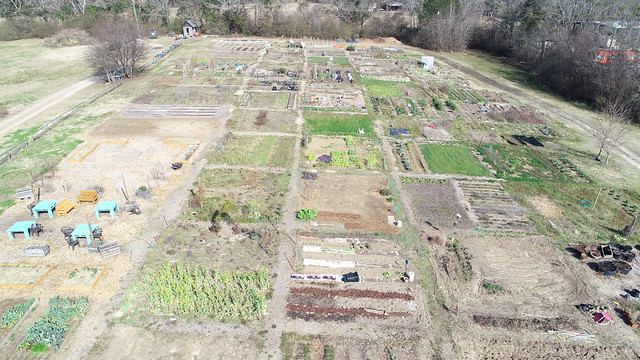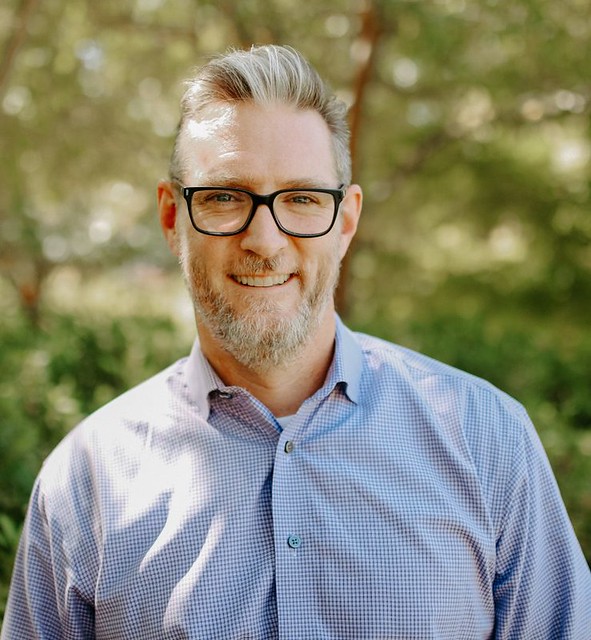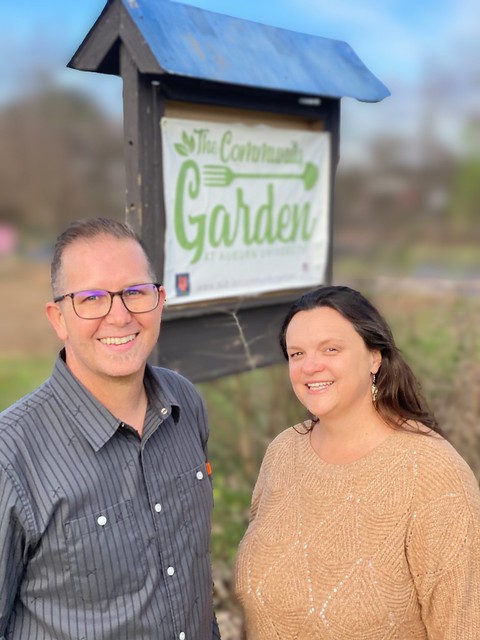Student-inspired Tiger Giving Day project to make The Community Garden at Auburn University accessible for all
Article body
An Auburn University hidden gem that provides sustenance and sanctuary for countless community members will be accessible to all in the near future thanks to a Tiger Giving Day project inspired by a dedicated group of campus collaborators.
Occupying a roughly two-acre plot and nestled between the Robins & Morton Construction Field Lab and the Advanced Structural Engineering Laboratory on West Samford Avenue, The Community Garden at Auburn University has been a mainstay in the campus landscape for more than four decades. It has long offered Auburn Family members and area residents a place to enjoy growing their own food, while also providing a boost to Campus Dining’s food supply.
Krista Fincke—a graduate student in the Department of Biological Sciences in the College of Sciences and Mathematics, or COSAM—discovered the garden shortly after arriving on the Plains in 2019 to begin work on her master’s, but her access to the community resource was limited. Fincke, who has muscular dystrophy and began using a wheelchair at age 18, began asking about the possibility of adding raised garden beds and making the area more accessible during her time as a member of her department’s Inclusion Activity Subcommittee. With the assistance of Assistant Professor Brian Counterman and support from William Walker—who manages the garden for Campus Dining—the group approached Auburn Advancement, which helped get the project added to this year’s Tiger Giving Day lineup for Feb. 22.
“I talked to a friend of mine who is a former Auburn student who also uses a wheelchair and said, ‘Wouldn’t it be cool if the gardens had raised beds?” said Fincke, who earned her undergraduate degree at the University of South Florida. “Even though I have a really good chair that’s great going ‘offroad,’ the aisles were narrow, and the beds were not really raised enough to where somebody with mobility issues could access them. I joined the committee specifically because I wanted to advocate more for people with disabilities, and when we started brainstorming projects, this is what I came up with.”
COSAM’s Counterman will oversee the accessibility project, which has a fundraising goal of $15,000, and his wife, Amy—a professor of practice in the College of Forestry, Wildlife and Environment and landscape architect—will serve as the landscape designer. The team not only plans to add raised, accessible garden beds, but also to create semi-permeable drop-off spots, a navigable perimeter around the garden beds and parking areas to improve access for people with disabilities.
“We want to make it so that wide groups of people from Auburn and the broader community can have access to this longstanding community garden,” said Brian Counterman, who chairs his department’s Inclusion Activity Subcommittee. “I’m real excited that I can carry this torch and do this project, and we think it is unquestionably going to make a difference for the community. Amy and I kept running into William at farmer’s markets, and we said, ‘We’ve got to make this happen.’”
The funds raised also will provide accessible tools and storage lockers, new signage and paved aisles at the garden. The group hopes to align the creation of accessible beds with an already approved irrigation improvement project that will be applied at the garden this year.
The garden’s members include individuals from Auburn’s campus and the neighboring community, and visitors can see diverse cultures represented by international participants growing a variety of food from around the globe. The operation provides food to The Campus Kitchen, which serves students with food insecurities, and has partnerships with area, local and state food banks.
“One of the things that is important to us is building a place that fosters community and that reaches out to the local populace outside Auburn University,” said Walker, a U.S. Marine Corps veteran who has been at Auburn for eight years. “This project is exciting and was the perfect next step for finding a new way to bring in another level of community, a new group of people into the garden, and it’s exciting. It’s been awesome to see how people interact with the students we have working out there and the partnerships we’ve been able to make, and the community aspect is really huge for us.”
Auburn’s Department of Horticulture in the College of Agriculture utilizes the garden in several classes, and the space also hosts community events and produces thousands of pounds of food each year that is both infused into Campus Dining’s programs and donated to area food banks. Walker took over as the administrator of the garden seven years ago from the Office of Sustainability and under the management of Marley Halter, who initiated a number of improvement projects and laid the foundation for its continued growth.
“When running the garden, we look at it through the lenses of how we create community and how we provide hunger solutions, sustainable agriculture and education,” said Walker, who serves as assistant director of Campus Dining. “We’re always trying to be innovative, but at the same time make sure we’re staying in line with our core values and our mission. I just keep moving forward because I see the value in what this place brings.”
The garden features several plot sizes ranging from 90-900 square feet, with affordable rentals available for anyone interested. Walker said the plots fill up fast, usually by the start of the gardening season—which this season runs from March to February 2024.
For Fincke, the Tiger Giving Day project represents an opportunity to make the garden available for a wider group of people to enjoy. It also aligns with her personal passion of creating equity for those who have been marginalized.
“A great thing about making it accessible for the entire community is giving people a resource they didn’t have before,” said Fincke, who was featured on the cover of the July 2022 Opelika Living magazine. “By having this resource, we can expand it to even more people from different demographics.
“As I’ve gone through my disability journey, I’ve seen the struggles people with disabilities have to overcome, and it’s really ignited a passion and an interest in equity. The more it’s in the spotlight, the more awareness people have, and I’ve been really compelled to do what I can to help level the playing field.”
She has been surprised by the speed of the collaboration across Auburn’s campus to fast-track this important initiative.
“I never pictured it getting this much attention when I first had the idea,” Fincke said. “I never thought it would get this far, and it becoming part of Tiger Giving Day is when I got really excited.”
Fincke agreed the garden’s accessibility improvements will help demonstrate the university’s continued commitment to making the campus safe and accessible for everyone.
“I’m glad there has been a push in the past 10 years or so at Auburn, and I can definitely speak for my department in how it is really committed to accessibility and equity for everybody,” she said.
Brian Counterman hopes the exposure of the project’s inclusion in Tiger Giving Day will serve as a springboard for its success. He said the group plans to implement the improvements and new features throughout the remainder of 2023 and is looking at early 2024 for completion of the accessibility enhancements.
“Cutting a ribbon a year from now would be ideal,” Counterman said. “It’s going to take a bit of time, but it’s just been so easy and pleasurable working with this group so far. I’m really happy I’ve been able to play this role, and I will stick with this to make sure it gets to the finish line.”
The garden and this accessibility initiative encapsulate a line from the Auburn Creed: “I believe in the human touch, which cultivates sympathy with my fellow men and mutual helpfulness and brings happiness for all.” Cultivating food, helping community members enjoy a valuable resource and providing happiness for those who utilize the garden are activities that exemplify the creed and can improve a community’s mental health in profound ways.
“It’s no secret that being outside and getting fresh air and sunlight helps with people’s mental health,” Fincke said. “For students, it’ll get their mind off whatever is stressing them out at school, and I know there’s something stressing them out. Being outside and being connected to nature is so important, and it has a great effect on your mood.
“Not only that, but you get to grow vegetables and have a little project where you have this little thing that you nourish and take care of. It rewards your hard work with a vegetable and makes you feel good. It’s just great.”
Related Media
Media interested in this story can contact Communications Director Preston Sparks at (334) 844-9999 or preston.sparks@auburn.edu.
Auburn University is a nationally ranked land grant institution recognized for its commitment to world-class scholarship, interdisciplinary research with an elite, top-tier Carnegie R1 classification, life-changing outreach with Carnegie’s Community Engagement designation and an undergraduate education experience second to none. Auburn is home to more than 30,000 students, and its faculty and research partners collaborate to develop and deliver meaningful scholarship, science and technology-based advancements that meet pressing regional, national and global needs. Auburn’s commitment to active student engagement, professional success and public/private partnership drives a growing reputation for outreach and extension that delivers broad economic, health and societal impact.










